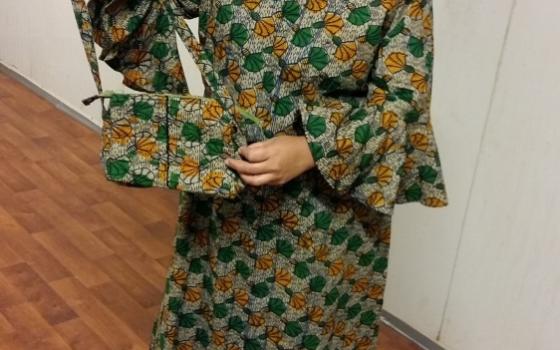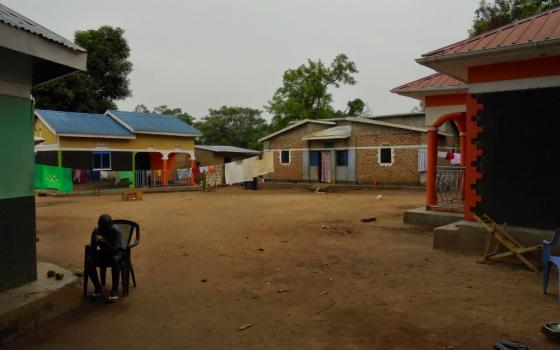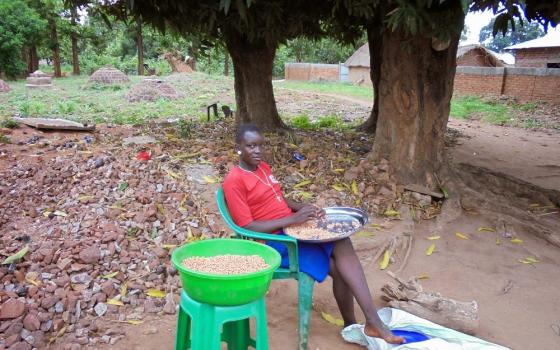Dr. Rachael Consoli spent three years working as an obstetrics and gynecology surgeon and clinical instructor for Harvard Medical School, Massachusetts General Hospital, Salem Community Health Center and North Shore Medical Center. Then she felt God was calling her to "do something radical" with her life.
Consoli grew up in a family of missionaries. She's been to every continent on Earth except Antarctica. When she was 10, her family moved to the Dominican Republic to minister to the people there for the next 15 years.
Then she heard that the Catholic Medical Mission Board had long been searching for an OB-GYN surgeon for its Safe Motherhood program in South Sudan, which has one of the highest maternal mortality rates in the world. Consoli, 45, knows that in many cases, no matter the skill of the midwife, surgery is required or the mother, baby or both will die during childbirth. There had been no American-trained OB-GYN surgeons in the country.
Still, she was leery until an organizer from CMMB called and said how badly she was needed. So she listened to her parents and siblings instead of the U.S. Embassy, which warned that the country was dangerous, and signed on for a one-year medical mission starting in April 2015.
She was stationed in Ezo on South Sudan's western border, where she worked for seven months until fighting erupted and the United Nations evacuated all aid workers in the area to Yambio.
On Nov. 16, Consoli wrote on her blog: "Please keep me in your prayers. But more importantly, pray for the people of South Sudan and for the Arrow Boys [rebels] that we will soon have true and lasting PEACE!!! God bless beautiful South Sudan. This is a beautiful country and the people are even more beautiful!!! I want to live here forever."
Two days later, she was evacuated from Ezo, and a week after that, she was kidnapped by rebels but was released unharmed four hours later. She was then moved to Nzara, where she lived with and worked in the hospital run by the Comboni Sisters. She returned to the United States last month.
GSR: Even with your background, South Sudan seems — to put it in your words — a radical move. How did you end up there?
Consoli: When I heard about this program, I felt like it was a place where I could really make a difference. And for the first seven months in Ezo, daily we saved women's lives. As a physician, that is the most satisfying thing that can happen to you.
It's also humbling because what did they do before I got here? They died. What will they do after I leave? They'll die.
How did you end up getting kidnapped, especially since you had already been evacuated to an area considered safe? And, more importantly, how were you released unharmed just a few hours later?
First, war broke out in Ezo. I was doing a prenatal clinic, measuring my beautiful pregnant ladies, when I get a phone call from the church. She was like, 'I wanted to warn you about something. All the kids just took off and ran home from the school and said there's going to be trouble.'
People warn me all the time — it's South Sudan and there's a war — so while you take every warning seriously, most of them are just warnings. But when I came back out to the clinic, all the women had disappeared. Every patient in the hospital took off. I said, 'Where did everybody go?' and the staff said, 'A war's going to start.'
And as soon as we started walking out, there was gunfire and bombs going off. We couldn't get home because of the fighting, so we snuck to the church and the priest took us in and then helped us hide in the bush. We had to hide in the bush for two weeks — the priest was sending altar boys off to get us bananas. Finally, the United Nations came and evacuated us to Yambio.
A week later, I was going for a walk to get some exercise and clear my head when I accidentally walked into rebel territory. It's not like there's signs. They stopped me and said, 'Get on the motorbike,' and I said no. Then seven machine guns appeared, so I got on the motorbike. And every book I've ever read about being kidnapped says, 'Don't ever let them take you,' and here I had let them take me. So I was crying, thinking, 'This is not a beautiful martyr's death, this is because I went for a walk for my health.'
We rode for an hour into the jungle, and then we got to this rebel compound, where all the people were very nervous and getting drunk, so it was very dangerous. And the whole time, I was trying to push out of my head the thoughts that they can rape or kill me and just concentrate on getting them to call the priest, call the bishop.
They kept saying, 'We're not going to touch you because we just signed a peace treaty with the bishop.' I think I shocked them because I was very aggressive and forward, which they're not used to. I said, 'I saved your commander's wife and his baby's life. They know me. You ask him. What do you think you're doing?'
But eventually, they didn't know what to do with me, and that's when I got really frightened because they started touching their guns a lot, and the books all say that a lot of times they just kill someone because they don't know what to do with them.
So I prayed for a miracle, and just then it started raining, which distracted them from the problem of what to do with me. Eventually, the young man on the motorbike returns and has the priest on the phone, who verifies that I'm not a spy, and he tells me not to wait for the CMMB truck that's on its way but to get on the motorcycle and leave as fast as possible, which we did.
CMMB then put me in hiding in Juba [the capital] for a week, and then I went to Nzara to work with the Comboni Sisters.
During those frightening hours, did you wonder if maybe you misheard God's call or that God had led you into danger? What goes through your head when you're where you think God wants you only to be in mortal peril?
When I was kidnapped, I didn't feel like, 'What's going on?' I knew God wanted me there, saving those women's lives. I felt like it was human error. I made a mistake going for a walk; they thought I was a spy. I just felt like it was part of what was going on. I just felt like it was part of my experience. I also felt like, these rebels are also sad — they need jobs. They've been misled. The leaders tell them, 'We'll all give you jobs, and as soon as we take over, you're all going to get high positions in the government.'
On a very human level, I have six brothers and one sister, and we travel the world and look for adventure, and I couldn't help thinking, 'This is going to be the best story of the year. This is going to win. If I get out of this alive, my brothers are going to be so jealous. They're not going to believe it.'
And now that you're home, the ultimate question: Will you go back?
I'm praying thoughtfully, seeking, about if I'll go back. But in the month of December, when I was in Nzara instead of Ezo, there were already six maternal deaths. Those six probably would have lived had I been there. My mother is a teacher in an inner-city, impoverished public school in the Boston area, and she said, 'If you go back, I might just retire and go with you and help you out.' We just feel like God is with us, and it's God's will to help where we can.
It breaks my heart, what's going on there. And the ones that suffer the most are the women and children. And these are beautiful people. Who's in the bush hiding? Who's starving? The women and children. Many people have told me, 'Doctor, this is not going to stop until we kill everyone we have to kill and start from the ground up.' My God, how can you even say that? As an outsider, I cannot say I felt that one tribe is horrible and the others are wonderful, I felt that all of them are wonderful. All of them.
So it's not official, but in November or December, I'll probably go back.
[Dan Stockman is national correspondent for Global Sisters Report. His email address is dstockman@ncronline.org. Follow him on Twitter or on on Facebook.]



